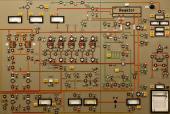Unter Kontrolle
/ Under Control
In his documentary film, Volker Sattel makes it quite clear that the technology of the socalled peaceful use of nuclear technology originates from the Cold War era, the 1950s. Sitting safely on our cinema seats, the film takes us on a journey through the German landscape of nuclear power stations, the insides of which appear all too frequently to be reminiscent of Kubrik’s 2001.
The film starts with a promise. Something glows, vibrates for a moment, builds structures of beauty – a ›light‹, that our eye cannot see, the wild heart of a technology, which circulates around the term ›control‹ since its inception.
We are gazing at the unfinished monument of a glorious future that is fascinating till today, in spite of its cracks and dangerous contradictions. Under Control bears in mind how big the effort is, this science fiction which means: ›peaceful‹ use of nuclear energy, to reconcile with reality.
The film explains this world in small doses, providing insight into the secretive life behind the walls of German nuclear plants. We see glistening bright control centers, Decontamination doors, fog machines, to enter the depth of the deposits to experience the power of superhuman rationality that supposes to keep the power of the smallest parts under control.
Not coincidentally the architecture and the props are reminding of a space flight on earth. Even in this world mistakes are ›forbidden‹. But as we are already having trouble to accept the idea of a journey over decades, the half-live periods of radiant substances burst our bonds of imagination.
People – usually men – try to be in control of the antiquated technical plants, and reassure us, almost continually but also with great conviction, that the system created by humans can manage itself, control itself and, if necessary, switch itself off at any time. ›If faults occurred in the past, they were always caused by the inadequacies of the operators,‹ is the gist of one responsible official’s assertion. Sattel refreshingly lets the statements pass without comment; it is the magnificent film images alone, compiled over three years of research, that cause us to doubt the narration. At the end remains the sensation of futility. It almost seems as if we have disappointed the nuclear power, not the other way around. The miracle of this technology is waiting patiently for a new human being that is more rational – and not afraid of eternity.
Director/author: Volker Sattel
Germany 2010
Film & Video 35 mm 98 min.

